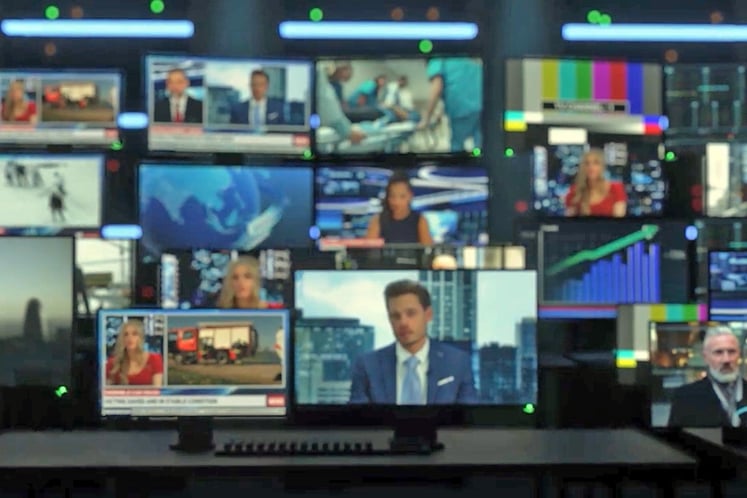Can we grow the publics for climate change news?
Video player requires marketing cookies.
To view this content please click here to allow marketing cookies.
Watch the recorded session here.
Over the past few years, traditional media has been hit hard. Overall trust and viewership for news is continuing its downward trend. Up to 40 percent of the audiences that have left tend to avoid news, because they find it too depressing. Who and where are the audiences for climate change news?
Speakers
- Alexandra Borchardt – Independent journalist, researcher and consultant and a board member of the Constructive Institute in Aarhus, Denmark, which promotes constructive journalism by emphasising solutions and nuanced coverage.
- Ivan Couronne – "Future of the Planet" chief editor at Agence France-Presse in Paris. He oversees climate coverage for AFP's 1,700 journalists worldwide. Working with AFP's business, environmental and general news reporters, he is in charge of unifying coverage of the causes and impact of climate change, of the energy transition, and of the responses to the climate crisis.
- Shereen Daver – Shereen has over 20 years of experience as a communications specialist and innovation lead from her work with global advertising agencies, F100 Organisations and as a founder. She is an ICF accredited integral coach, regenerative strategist, creative and business developer. She is the Programme Director for climateXchange, on a mission to reshape the climate journalism media ecosystem.
- Dr. Lagipoiva Cherelle Jackson – Award-winning Pacific Island journalist and scholar. For over 20 years she reported from the frontlines of the climate crisis in her home islands of Samoa. Her work has been featured in The Guardian, AFP, AP, Al Jazeera, Washington Post, and others. She is the host of 'An Impossible Choice' a podcast series by The Guardian on the existential nature of the climate crisis for Pacific Island countries.
- Lars Tallert – Lars is the founder and President of the Sustainable Journalism Partnership, a newly founded global NGO that explores the relationship between sustainable societies and independent journalism. Lars is also a senior advisor at Fojo/Linnaeus University, Sweden’s Representative to UNESCO/IPDC Intergovernmental Council and Policy Advisor to the Global Forum for Media Development.
Video player requires marketing cookies.
To view this content please click here to allow marketing cookies.
Summary of Session 2: Can we grow the publics for climate change news?
Climate change is the greatest existential threat to humanity and informed reporting that leads to action is more important than ever. But overall trust for traditional news is continuing its downward trend.
Up to 40 percent of the audiences that have left tend to avoid news, because they find it too depressing. Research shows that people are tired of gloomy climate news reporting and stop listening to it.
The overall question in the second session of the day was: is there any hope? The short answer is yes, and in this session the panel guided us through current challenges and solutions on how to catch audience attention.
Key points
- Tailoring language and different audiences: According to Alexandra Borchardt, finding ways to communicate about climate change without succumbing to the “bad news problem” has become crucial. She explains that tailoring language and visuals to different audiences is key for engagement. “We need to reach people on the platforms they engage with and through voices they trust,” Borchardt says. “Facts alone don’t help. Research shows that more information doesn’t necessarily change minds; the credibility of the messenger is paramount. Audiences engage more with climate news from voices they trust.”
- Bring climate context into all your stories: Most journalists who are engaged in constructive reporting are not climate journalists, says Ivan Couronne. Therefore it is necessary to change the culture of news reporting. At Agence France-Presse, journalists got the message that future of the planet should have priority. “We try to have all reporters to bring climate context in their stories when it is relevant” he says. For example, all journalists at AFP were trained in reading and understanding IPPC reports, what to ask NGO’s and learning to speak to diverse sources rather than just the usual commentators. The most important question in the training was: how do you recognize green washing?
- Rewriting constructive journalism: News about the climate is normally presented in an activist, political, economic, or polarised way. Shereen Daver wants to rewrite climate journalism as a cultural currency by developing skills, knowledge, solutions, narratives, and cultural experiences to build a positive climate culture. She suggests the way to do that is to bring knowledge from local communities – researchers, businesspeople, politicians, journalists et cetera – together and help them with solutions.
- Local journalism is crucial: Lagipoiva Cherelle Jackson emphasises that local journalism is crucial in fostering hope and action within communities affected by climate change. Lagipoiva underscores the responsibility of journalists to highlight stories of local resilience and innovation: “Local journalists capture, translate, and transmit knowledge, especially in communities where English is not the first language. They ensure that Indigenous knowledge and history are accurately depicted and contextualised.” By telling these stories, local journalism not only preserves cultural heritage but also inspires wider adoption of successful strategies.
- Sustainable journalism: The movement for sustainable journalism is growing, according to Lars Tallert, but to ensure long-lasting change without losing journalistic integrity, systemic changes are needed. He argues that the shareholder business model of news reporting - where the only responsibility for a company is to make profit for its shareholders – is obsolete. He suggests that a more suitable business model for the future could be the stakeholder model, where there is a shared interest - environmentally and socially - for a sustainable world.
- Another perspective: reaching audiences through art. From the floor of the conference, Boris van Westering talked about what happens when you put art and journalism together. With solid data collected over two years about water finance, migration of falcons and wildfires in Morocco he tried to rebuild stories so he could tell them from a different perspective.
- Effective messaging: The panel also offered perspectives on effective messaging; don’t search for confrontation with people who don’t believe climate change is happening. Instead enable the people that are already convinced to bring others to along; Bring as many young people and people from diverse backgrounds on board as you can, to generate as many perspectives as possible. Think locally and make use of local people and knowledge. Find optimistic stories and positive advice.
Reference materials
- Reuters Institute for the Study of Journalism – Digital News Report, 2024
- Potential Energy Coalition – Global Report “Later is too late”, 2024
- Edelman – Trust Barometer “Innovation in Peril”, 2024
- Kantar – Sustainability Sector Index, 2023
- Climate Action Against Disinformation – Climate Mis-/Disinformation Backgrounder, 2023
- EBU – News Report: Climate Journalism That Works, 2023
- Institute for Strategic Dialogue – Deny, Deceive, Delay Vol. 3: Climate Information Integrity ahead of COP28. 2023
- Reuters Institute for the Study of Journalism – How we follow Climate news, 2022
- Vattenfall/TNS Kantar – “The conversation on climate change”, 2020





